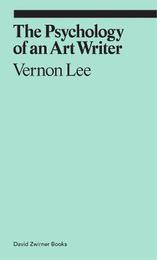
|
The Psychology of an Art Writer
Paperback / softback
Main Details
| Title |
The Psychology of an Art Writer
|
| Authors and Contributors |
By (author) Vernon Lee
|
| Series | Ekphrasis |
|---|
| Physical Properties |
| Format:Paperback / softback | | Pages:136 | | Dimensions(mm): Height 177,Width 107 |
|
| Category/Genre | Art History |
|---|
| ISBN/Barcode |
9781941701782
|
| Audience | |
|---|
|
Publishing Details |
| Publisher |
David Zwirner
|
| Imprint |
David Zwirner
|
| Publication Date |
22 March 2018 |
| Publication Country |
United States
|
Description
An openly lesbian, feminist writer, Vernon Lee-a pseudonym of Violet Paget-is the most important female aesthetician to come out of nineteenth century England. Though she was widely known for her supernatural fictions, Lee hasn't gained the recognition she so clearly deserves for her contributions in the fields of aesthetics, philosophy of empathy, and art criticism. An early follower of Walter Pater, her work is characterized by extreme attention to her own responses to artworks, and a level of psychological sensitivity rarely seen in any aesthetic writing. Today, she is largely overlooked in curriculums, her aesthetic works long out of print. David Zwirner Books is reintroducing Lee's writing through the first-ever English publication of "Psychology of an Art Writer" (1903) along with selections from her groundbreaking "Gallery Diaries" (1901-1904), breathtaking accounts of Lee's own experiences with the great paintings and sculptures she traveled to see. Ranging from deeply felt assessments of the way mood affects our ability to appreciate art, to detailed descriptions of some of the most powerful personal experiences with artworks, these writings provide profound insights into the fields of psychology and aesthetics. Her philosophical inquiries in The Psychology of an Art Writer leave no stone unturned, combining fine-grained ekphrases with high fancy and dense abstraction. The diaries, in turn, establish Lee as one of the most sensitive writers about art in any language. With a foreword by Berkeley classicist Dylan Kenny, which guides the reader through these writings and contextualizes these texts within Lee's other work, this is the quintessential introduction to her astonishing and complex oeuvre.
Author Biography
Under the pseudonym Vernon Lee, Violet Paget (1856-1935) published a bewildering variety of work, including historical studies; meditative essays on art, music, gardens, and travel; philosophical dialogues; treatises on aesthetic theory and psychology; and supernatural tales. Born to a cosmopolitan English family, she settled in Florence, where she maintained friendships with artists and intellectuals throughout the world, including John Singer Sargent, Mary Cassatt, Edith Wharton, J.A. Symonds, Walter Pater, Charlotte Perkins Gilman, and G.B. Shaw. In close collaboration with her partner, the artist Kit Anstruther-Thompson, she was one of the first English thinkers to seriously engage with German empathy theory. Together, they tried to capture the mysterious and complex workings of art on our bodies, our minds, and our social lives; one of the fruits of this investigation was the 1912 volume Beauty and Ugliness, which included and analyzed long excerpts from Lee's own Gallery Diaries. Partially as a result of her strong pacifist politics and opposition to World War I, Lee became somewhat estranged from the literary establishment, although she continued to write prolifically until her death. Dylan Kenny is a writer and PhD student in Classics at the University of California, Berkeley. He co-edited the exhibition catalogue Jason Rhoades: PeaRoeFoam (David Zwirner Books, 2015.)
Reviews"A recently published volume of Vernon Lee's writing reveals a woman who is a product of privilege, as well as someone who used what it afforded her to resist the status quo."--Alexis Clements "Hyperallergic" "As dangerous and uncanny as she is intelligent, which is saying a great deal..."--Dylan Kenny "The Paris Review" "What a find. And what an important book for today. But then, what we are given is more subtle. Lee's way of appreciating art, examining why you feel it but never questioning whether this feeling has value, begs to be read now."--Staff "Elephant" "What's striking about Lee's writing here is the openness and what one might almost describe as the nakedness with which she embraces the multiplying sensations and apprehensions that shape her experience."--Jed Perl "New York Review of Books"
|